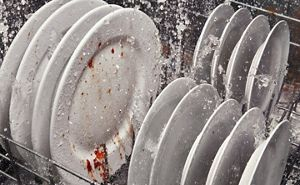
Why is my dishwasher not drying dishes?
Your dishwasher helps you streamline post-meal cleanup, and it can be frustrating when you have to hand dry your dishes after a wash cycle. There are several possible causes for a dishwasher that isn’t drying correctly, and understanding the cause can help you find the right solution. Use the following article to learn more about dishwashers that aren’t drying properly.


Should my dishes be dry after a dishwasher cycle?
Dishes that have gone through a wash cycle with an additional dry selection should be dry when they come out of the dishwasher. Some settings, like Air Dry or Fan Dry, don’t use heat and may not dry your dishes as thoroughly.
If you’ve selected a Heated Dry or Extended Dry Cycle and your dishes are still coming out wet, you may need to take a closer look at your dishwasher and the products you use. Consider how you place your dishes on each rack, as improper placement can cause water to puddle.
Some plastic items pose a drying challenge due to their lower thermal conductivity. Using a rinse aid during the wash cycle can help dry plastic items.

Need help finding your new dishwasher?
Read Article

4 reasons your dishwasher isn’t drying
Different issues can contribute to a dishwasher not drying dishes completely. Read on below to discover the possible causes of your damp dishes so you can find the right solution.

1. You selected the wrong dishwasher cycle option
Depending on the make and model of your dishwasher, there may be dishwasher cycle settings that use less or no heat to dry your dishes, possibly leading to less thorough drying. Before each wash cycle, make sure you select a Heat Dry or Extended Heat Dry setting if you want your dishes to come out nice and dry.

2. The heating element is malfunctioning
Your dishwasher’s heating element is responsible for raising the water temperature during the wash cycle and the air temperature during the drying cycle. If your heating element isn’t working, your dishwasher may not clean and dry your dishes properly.
This is a problem best left to a professional technician, so be sure to schedule a service appointment if you believe this is the cause of your dishwasher not drying.

3. You need to use a rinse aid
Modern dishwashers are designed to use less water and energy throughout the wash cycle. Using a rinse aid with your dishwasher detergent can help improve drying performance. Rinse aids work with Heat Dry and Extended Heat Dry to help remove the remaining water from your dishes and the interior of your dishwasher.

4. Your dishes were improperly loaded
Incorrectly loading your dishes can reduce your dishwasher’s cleaning and drying capabilities during the wash cycle. Properly load your dishes by not overcrowding the dishwasher racks and place items at an angle, when possible, to assist with proper drying and dishwasher draining.
Tip:
Glasses, cups and bowls with concave bottoms may hold excess water that the drying cycle can’t evaporate completely. This water may also spill onto other items when unloading, leaving your dishes wet. Unload the bottom rack first to help avoid any excess water on the top rack from spilling onto the clean dishes below.

Large Capacity Dishwasher with 3rd Rack
Load more, run less*
Load hard-to-fit utensils or measuring spoons to free up more space for dishes below with Whirlpool® Dishwashers with 3rd Rack
*Compared to Whirlpool® Dishwashers without a 3rd level rack.
Shop Whirlpool® dishwashers


Should I leave the dishwasher door open to dry dishes?
You should always use your dishwasher following the instructions in your owner’s manual. Some manufacturers recommend leaving the dishwasher door open to dry your dishes after a wash cycle, while others recommend allowing the Heat Dry cycle to run entirely.
If you prefer to allow you dishes to dry naturally, you can open the dishwasher door at the end of the cycle to air dry the load. This method may take as long as 6–8 hours to completely dry your dishes.
How can I tell if my dishwasher heating element is bad?
You can test your dishwasher heating element by running a Sanitize wash cycle. If the Sanitize light on the control panel is blinking or doesn’t light up, there may be a problem with the heating element and you may need to schedule a service appointment.
If your dishwasher doesn’t have a Sanitize Cycle, you can test the heating element by selecting the 1-Hour Wash Cycle with the Heated Dry Option. Once the cycle has ended, check to see if your dishes feel warm. If they aren’t warm, there may be a problem with the dishwasher heating element.
Tips for getting dishes dry in a dishwasher:
Sometimes your dishwasher isn’t drying because of a component malfunction; other times, it’s due to user error. The following tips may help you dry your dishes after every wash cycle.
Load your dishes at a downward angle so water can easily slide off the surface.
Avoid overcrowding the dishwasher racks to allow enough space for the hot air to reach each dish.
Choose the right wash cycle with a Heat Dry or Extended Heat Dry setting.
Use a rinse aid for improved drying performance and to help avoid excess moisture inside your appliance.
Explore Whirlpool® dishwashers
Stay on top of dish duty with the help of Whirlpool® dishwashers designed to help you care for your family’s dishes. With features on select models like Folding Tines that create the space you need for large and small items and the Extended Soak Cycle that presoaks and washes your dishes all in one cycle, you can customize your dishwashing routine to fit your needs.


Helping kids stay in school
Learn how Whirlpool helps end the dropout cycle by giving kids access to clean clothes through the Care Counts™ Laundry Program
Was this article helpful? Pass it on
Explore more from Whirlpool brand
-
 How Long Do Dishwashers Run? Most dishwasher cycle times can last anywhere from 1.5 to 4 hours. The average dishwasher run time can vary based on which dishwasher cycle you select.
How Long Do Dishwashers Run? Most dishwasher cycle times can last anywhere from 1.5 to 4 hours. The average dishwasher run time can vary based on which dishwasher cycle you select. -
 What Is the Sanitize Cycle on a Dishwasher? What does the sanitize cycle on a dishwasher do? Learn more about how your dishwasher sanitize cycle kills 99.999% of food soil bacteria for a deeper cleaning.
What Is the Sanitize Cycle on a Dishwasher? What does the sanitize cycle on a dishwasher do? Learn more about how your dishwasher sanitize cycle kills 99.999% of food soil bacteria for a deeper cleaning. -
 Dishwasher Buying Guide 2026 Type, size, efficiency, cycles and budget are all things to consider when buying a dishwasher. Use this dishwasher buying guide to find the right fit for you.
Dishwasher Buying Guide 2026 Type, size, efficiency, cycles and budget are all things to consider when buying a dishwasher. Use this dishwasher buying guide to find the right fit for you.


home heartbeat
Ready for more tips, home hacks and appliance guides?

